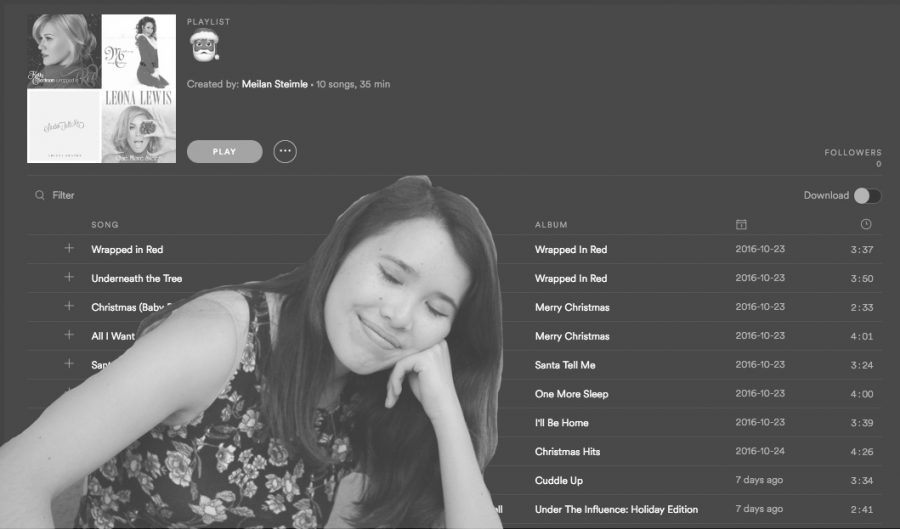Pop Philosophy: Examining philosophical interpretations of Christmas pop music
November 17, 2016
I have a confession to make – I’ve been listening to Christmas pop music since early October.
I know, I know. I’m terrible, but nothing gets my blood pumping like the throaty vocals of Mariah Carey describing her (very short) Christmas list or lamenting a failed wintertime relationship. Why confine that kind of unadulterated holiday joy to a single month when I could be dancing under the metaphorical mistletoe before Halloween?
I recognize this isn’t a widespread opinion. My ilk of overzealous holiday spirits is the butt of every easy Christmas-themed joke in mediums ranging from stand-up comedy monologues to acapella medleys (seriously – Google “The Christmas Can-Can”). “You disgust me,” a friend told me (in jest). “Christmas music is only appropriate the day after Thanksgiving.” To many, Christmas pop represents some of the worst things about the holidays – the rampant consumerism, the purported bastardization of a once-religions holiday, and the use of jingle bells as a main background instrument.
But I think there’s a lot to be learned from these supposedly vapid holiday cash grabs.
All I want for Christmas is You – Mariah Carey
I don’t want a lot for Christmas/ There’s just one thing I need/ I don’t care about presents/ Underneath the Christmas tree
In a fascinating upset of Maslow’s Hierarchy, Carey contends that her love for her significant other trumps corporeal needs like food and water. Truly, she is a philosophe for a new era.
One More Sleep – Leona Lewis
I got 5 more nights until you’re next to me/ 4 more days of being lonely/ 3 more wishes I can make and/ If I could make it till Christmas Eve/ Then it’s one more sleep/ One more sleep until it’s Christmas
Lewis makes a cogent contribution to a long-running philosophical problem: if the self is the continuation of consciousness, do we die every time we sleep? Contrasting the loneliness of her current self with who she will be in less than a week, Lewis displays a phoenix-like drive for rebirth.
Last Christmas – Wham!
Last Christmas, I gave you my heart/ But the very next day you gave it away/ This year, to save me from tears/ I’ll give it to someone special
The duo uses this mournful 1980s tune as a vehicle for an economic analysis of love. Must love be requited to be valid? Is falling in love voluntary? According to Wham!, love is a tangible resource available for use at our individual discretion, produced by each individual, with variable use-value when converted into individual emotional currency.
Santa Tell Me – Ariana Grande
Santa, tell me if you’re really there/ Don’t make me fall in love again if he won’t be here/ Next year/ Santa, tell me if he really cares/ ‘Cause I can’t give it all away if he won’t be here/ Next year
Grande’s song is an allegory for a struggle with religious faith masquerading as a simple Christmas ditty. “Santa” acts as an analog for God, and Grande portrays the unsure member of the congregation apprehensive about renouncing material pleasures in the face of deity whose existence remains uncertain.
Are these interpretations a stretch? Maybe. But finding joy in unexpected places? It might be just me, but I think that’s the true meaning of Christmas.
This piece was originally published in the pages of The Winged Post on November 16, 2016.


















![“[Building nerf blasters] became this outlet of creativity for me that hasn't been matched by anything else. The process [of] making a build complete to your desire is such a painstakingly difficult process, but I've had to learn from [the skills needed from] soldering to proper painting. There's so many different options for everything, if you think about it, it exists. The best part is [that] if it doesn't exist, you can build it yourself," Ishaan Parate said.](https://harkeraquila.com/wp-content/uploads/2022/08/DSC_8149-900x604.jpg)




![“When I came into high school, I was ready to be a follower. But DECA was a game changer for me. It helped me overcome my fear of public speaking, and it's played such a major role in who I've become today. To be able to successfully lead a chapter of 150 students, an officer team and be one of the upperclassmen I once really admired is something I'm [really] proud of,” Anvitha Tummala ('21) said.](https://harkeraquila.com/wp-content/uploads/2021/07/Screen-Shot-2021-07-25-at-9.50.05-AM-900x594.png)







![“I think getting up in the morning and having a sense of purpose [is exciting]. I think without a certain amount of drive, life is kind of obsolete and mundane, and I think having that every single day is what makes each day unique and kind of makes life exciting,” Neymika Jain (12) said.](https://harkeraquila.com/wp-content/uploads/2017/06/Screen-Shot-2017-06-03-at-4.54.16-PM.png)








![“My slogan is ‘slow feet, don’t eat, and I’m hungry.’ You need to run fast to get where you are–you aren't going to get those championships if you aren't fast,” Angel Cervantes (12) said. “I want to do well in school on my tests and in track and win championships for my team. I live by that, [and] I can do that anywhere: in the classroom or on the field.”](https://harkeraquila.com/wp-content/uploads/2018/06/DSC5146-900x601.jpg)
![“[Volleyball has] taught me how to fall correctly, and another thing it taught is that you don’t have to be the best at something to be good at it. If you just hit the ball in a smart way, then it still scores points and you’re good at it. You could be a background player and still make a much bigger impact on the team than you would think,” Anya Gert (’20) said.](https://harkeraquila.com/wp-content/uploads/2020/06/AnnaGert_JinTuan_HoHPhotoEdited-600x900.jpeg)

![“I'm not nearly there yet, but [my confidence has] definitely been getting better since I was pretty shy and timid coming into Harker my freshman year. I know that there's a lot of people that are really confident in what they do, and I really admire them. Everyone's so driven and that has really pushed me to kind of try to find my own place in high school and be more confident,” Alyssa Huang (’20) said.](https://harkeraquila.com/wp-content/uploads/2020/06/AlyssaHuang_EmilyChen_HoHPhoto-900x749.jpeg)










